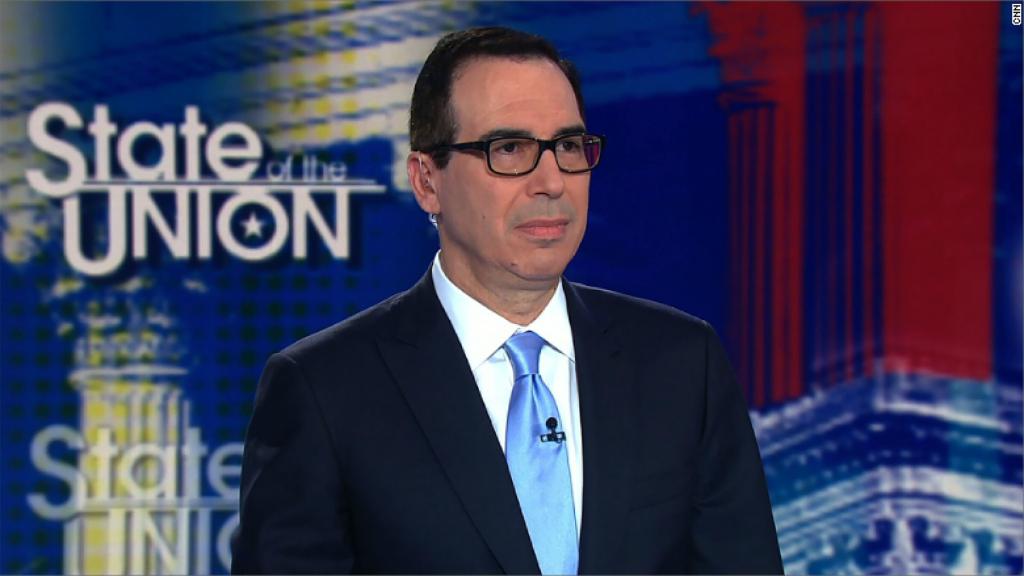
U.S. multinational companies are preparing to pay hundreds of billions of dollars in tax on profits they made overseas in the last 30 years.
New American tax rules mean firms can no longer avoid paying tax on past international profits by keeping the money outside the United States. They must pay tax whether they bring this cash back to the U.S. or not.
Goldman Sachs (GS) was the first big multinational to announce a hit to profits in 2017 from the new tax. It said on Friday that the "repatriation tax" was responsible for most of a one-off charge of $5 billion.
Tax experts expect many more big U.S. companies will announce similar one-off charges in the weeks to come.
"They should all come out with similar statements," said Ryan Dudley, head of international tax services at Friedman LLP.
The new rules require U.S. companies to pay a tax of between 8% and 15.5% on overseas earnings made since 1987 if they remain offshore. After making this one-off payment, they'll be able to bring the money back home without paying additional tax.
"For many U.S. multinationals, by far the biggest impact is that one-time charge," said Craig Hillier, head of the international tax practice at EY.
Under the old law, they would have owed a top rate of 35% when bringing foreign profits back to the U.S.
U.S. companies are expected to announce the tax hit now and pay the money in installments over several years. Congress expects this one-time charge will bring in an estimated $339 billion over the next 10 years.
While the one-time "repatriation tax" will sting, many companies stand to benefit from much lower tax rates in the future. Much of the earnings they make overseas in 2018 and beyond will no longer incur any U.S. tax, even if they're returned to the U.S.
Related: Will corporate tax cuts trickle up or down?
Moody's estimated in November that U.S. companies were holding about $1.4 trillion in cash offshore.
It projected that five major tech companies -- Apple (AAPL), Microsoft (MSFT), Cisco (CSCO), Oracle (ORCL) and Google's parent company Alphabet (GOOGL) -- would be holding $594 billion in cash overseas at the end of 2017.
Pharmaceutical giants including Johnson & Johnson (JNJ), Merck (MRK) and Pfizer (PFE) were also named as major holders of overseas cash in a 2017 report by Oxfam.
Apple CEO Tim Cook said in 2015 that he would "love to" repatriate foreign profits but he couldn't because "it would cost me 40%." He was referring to the combined U.S. federal and state tax rate Apple would likely have owed under the old tax law.
Related: Enjoy your tax cuts while they last
Apple has $129 billion in offshore cash that has not been subject to U.S. tax, according to its latest annual earnings report. If all this was taxed at the upper 15.5% rate under the new rules, Apple would owe about $20 billion.
GE, meanwhile, had about $82 billion held outside the U.S. at the end of 2016. If this full amount is taxed at the 15.5% rate, the company would have to pay $13 billion to the taxman.
Related: It was an epic year for stocks in 2017
The huge tax overhaul -- which was signed into law last month by President Trump -- is expected to boost business by cutting the tax on U.S. earnings to 21% from 35%.
But the transition to the new system could be messy.
Many big international companies recently warned that other changes in the tax code will mean billions of dollars in one-off losses in 2017 as they have to write down the value of tax credits accumulated in previous years.
Major European banks Barclays (BCS), Credit Suisse (CS) and UBS (UBS), plus oil giants BP (BP) and Shell (RDSA), have indicated the new tax rules could cost them between $1 billion and $3 billion each in 2017.


